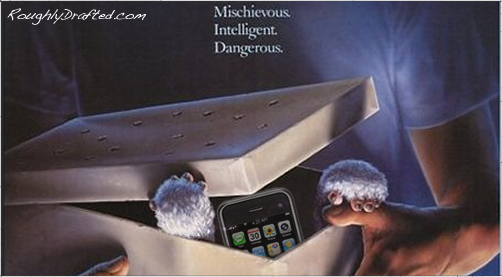


“Mobile Disruption: Apple's iPhone and Third Party Software” presented some of the issues surrounding the development of third party software for the new mobile, whether built upon Apple own Mac OS X Cocoa, or by Apple shoehorning in a generic middleware API for developers to use, such as Sun’s J2ME or Adobe Flash Lite.
In addition to showing off the iPhone's pretty interface as part of its first impression--including the Google Maps client Steve Jobs used to locate a Starbucks in order to place a crank call for a thousand coffees at Macworld--he also described the rationale behind the closed platform iPhone as a security and stability issue.
“You need it to work when you need it to work. Cingular doesn’t want to see their West Coast network go down because some application messed up,” he told Newsweek.
Don’t Feed Them Third Party Software After Midnight!
His statements have been criticized because other phones offer third party development, and there aren't reports of phone networks being brought down by renegade, malicious, or shoddy mobile software.
However, there are a number of things that are--or will be--very different about the iPhone, particularly if things go according to Apple's plans. Here are four factors that relate to Jobs’ crashing and security gremlins.
First, Apple plans for the iPhone to be very popular. Jobs’ ambitious “1% of all mobiles goal” for the iPhone means that Apple intends to eclipse the sales of all Windows Mobile, Palm Treo, and RIM Blackberry phones almost immediately.
Security researchers insist that the reason why Windows suffers from one security crisis to the next is not because Microsoft failed to invest in and plan for security, but because Windows is simply by far the largest platform and has the most exposure to attacks.
That's not really true, but there is certainly an element of truth to the idea that a larger target gets more arrows. People who write malicious software or who devise viral spambot installers or other adware marketing schemes certainly will get a bigger bang for their buck by designing them to exploit Windows PCs.
If Apple ends up with the mobile territory it expects to claim by the end of 2008, it will own the largest cohesive smartphone platform, and stand a prime target for anyone who wants to exploit adware or malware security holes in the mobile space. 

Apple will need to plan its security policy accordingly, or it will end up holding the reigns of the next Windows-like platform fiasco. That would not only be embarrassing, but a huge drain on Apple’s future ability to innovate, just as it has for Microsoft over the last decade.
Second, Apple plans for iPhones to be standard and ubiquitous. A related reason to why there hasn't been many wide outbreaks of phone malware or any big network attack problems is that there aren't any real mobile platforms that are common enough to exploit.
Software developers struggle to get legitimate J2ME software to run across more than a few flavors of different makers' phones. If regular software can't be expected to reliably run across a wide range of phones, how can lazy spammers be expected to magically roll out script-kiddie exploits that can affect a critical mass of phones?
Security researchers like to portray their black hat adversaries as genius elite hackers, but in reality, most of the spam, spyware, and malware payloads delivered by Windows viruses are rolled out by a few meatheads who can only exploit shoddy security. That’s why Macs don’t have 3% of the world’s market share of viruses.
A few Symbian phones were infected with viruses that could be passed among phones via Bluetooth, so there is some real precedent for concern about security issues. Symbian responded by introducing signed applications, a feature designed to limit the openness of the platform and therefore make it more secure.
 Currently however, the mobile market is shattered between platforms, and even within platforms. There are three main, incompatible branches of the Symbian platform and incompatible versions even among specific branches!
Currently however, the mobile market is shattered between platforms, and even within platforms. There are three main, incompatible branches of the Symbian platform and incompatible versions even among specific branches! That’s not just a barrier to a meaningful software platform, but also effective security by obscurity for mobile phones.
In contrast, in the new world envisioned by Apple for the iPhone there will soon be ten million identical phones which all run exactly the same software. They will all even be on the same network. That consistency in the “iPhone platform” will change the security landscape of the mobile world.
It makes sense for Apple to recognize that potential and plan its security policy appropriately. Leaving the door wide open to anyone may seem like a safe gamble today because there is not currently a serious problem, but again, that's the thinking that caused Microsoft to unleash upon the world a PC platform that is now satiated in commercial exploitation and serious security problems.
Apple invests in long term technology projects. QuickTime is now 16 years old. Mac OS X was in internal development for five years before emerging, and it was based upon the solid frameworks of the now 18 year old NeXTSTEP platform.
The iPhone isn’t a product vision Apple threw out to quickly “grab market share,” but a long term investment in entering the mobile space with the same style of innovation that reinvigorated the PC and music players.
Had Apple only released a demo reel of some existing telephony concepts and then claimed credit for all innovation in the industry retroactively, it would signal reason to start doubting its ability to deliver anything of interest.
Third, Apple intends the iPhone to be insanely great. At All Things Digital, Jobs told Walt Mossberg, “I’ve used 3rd party apps; the more you add, the more your phone crashes. No one’s perfect, and we’d sure like our phone not to crash once a day.”
“Insanely great” was a phrase Jobs used back in the early days of the Macintosh to encourage pride in high quality development. Rarely have similar phrases been used among rival electronics or software developers, and it shows. Today, the emphasis is commonly on being cheap and profitable, not high quality and exciting.
Users of Palm Treos and Windows Mobile phones have had their expectations set on low for many years. If an application locks up or stops responding, users commonly assume it was perhaps their fault for pressing the wrong button or “going too fast.”
DOS users similarly always blamed themselves for messing up, when the real problem was the lack of intelligence built into the PCs they struggled to use. Had Microsoft worked harder to deliver smart software, “DOS for Dummies” might never have been written. Instead, we have a culture of codependency upon shoddy tools.
Most people don't even realize that mobile phones don't have to suck, but only do because vendors don't care that much about end users. Mobile manufacturers are all working to please the mobile service providers who actually pay their bills. 

End users don't really buy their phones, the mobile providers do, using the convoluted subsidy buybacks that make mobiles appear to be free gifts from the wireless gods.
That will change with the iPhone, which repositions the mobile phone as a retail consumer device, not a fully subsidized and ultimately disposable rental unit.
Rather than being the equivalent to the confusing and arcane PC box of DOS that puzzled and humbled users back in the 80s--the role currently played by today's mobile phones--the iPhone intends to serve as the role of the iconoclastic Macintosh punk girl in red short-shorts, who storms through the grey world of marching drones and launches a hammer into the face of convention.
It can't do that if it crashes on the way down the hallway! Such a failure to launch would quickly be contained by the grey police in hot pursuit, seeking to keep things under control. That’s the next factor:
Fourth, Apple expects the iPhone to be criticized. Apple not only takes a lot of pride in delivering smart products, but its products are also held up to a different standard.
In the media, the iPod was defined by complaints: unreasonable expectations that its battery would last forever, or that its parts would never break, or that new models would never outclass existing ones. It's fashionable to spout complaints about Apple's products, with the more ridiculous complains being the most popular.
Just ask Wired, which both jeers and celebrates the “cult of Mac” while dishing out mainstream contempt for Apple presented as edgy hipster talk, albeit somewhat dated. Wired is so 1998; why not Wireless?
Conversely, Microsoft’s Zune was defined by the media’s defenses of its many flaws: how its intentionally nonfunctional Wi-Fi wasn't really a problem, how subscription plans can actually be convenient, and how nobody really needed PlaysForSure compatibility anyway.
After all, everybody likes an underdog, apparently even when it’s merely a front for a brutally criminal monopolist corporation using it as a ploy to enslave new markets to proprietary, Windows-only media standards and usher in a monoculture of rigid, impossible to rip Windows Media DRM. A scrappy contender!
In our up-is-down, war-is-peace world, the Zune is commonly portrayed a fledgeling rebel startup product working to install choice in the market, after the many choices offered by PlaysForSure were ignored, or perhaps, as the market failed to obey Microsoft’s marketing. 

Who cares that the only affect the Zune had was to gobble up some of Microsoft's own partner's puppies? It has the Social!
And of course, there are a lot of analysts and research groups who exist solely to service the Microsoft hegemony. It's their job--no, mission--to discredit anything that does not run Windows or otherwise enrich Microsoft.
To them, choice is threat, and anything that might upset the system that regularly feeds them for their services is very unwelcome and will be met with bitter, condescending propaganda. They don’t merely present a different opinion, but rather seek out opportunities to syndicate FUD and seed ideas they know are false into as many articles as journalists are willing to cite them in.
iPhone Talking Points.
These analysts, columnists, and market researchers have been working up talking points against the iPhone since ever it appeared. Their complaints are so predictable that I had no problem accurately presenting a series of myths on the iPhone before they could even get them out.
Taking a clue from slimy political leaders that prey upon the simple by unleashing torrents of knee-jerk simplespeak to drown out any rational thought or smart discussion of complex issues, they seek to publish headlines that shape public opinion, often without really saying anything at all.
Remember ABI analyst Philip Solis, who announced the nugget of genius that “the iPhone is not a smartphone?” That made headlines for weeks, with nobody pointing out--apart from RoughlyDrafted--that ABI was the same company that just months earlier had devised a way to research in such a way as to create the statistic that “58% of iPod Users May Choose Zune!”
ABI was unleashing false information in both cases in worthless attempts to sully Apple. Does it matter what some nobody firm decides to label the iPhone? No, but it was news because that nobody firm was able to craft it into a press release.
At least it was news to the blogosphere, which passed it around without much critical thought. It was also--albeit fleetingly--news to the media talking heads that now exist as a substitute for journalism in our society.
But why is it news to be told factoids that we know are not true? Anyone watching a short demo of the iPhone can recognize that the phone is clearly the result of some smart work. Do we really need a nobody firm issuing a report that it is not really smart to be fully informed as consumers?
Add “Not Technically Being a Smartphone Per Some Nobody Firm” to the list of anti-iPhone talking points:
-
•No disposable battery. How will we trash the planet?
-
•Scratches! Apple will probably forbid third party cases as well.
-
•No Chicklet Keyboard! And a Bluetooth keyboard might catch on fire.
-
•You may get fired for buying Apple, especially if you work for Steve Ballmer.
-
•Apple has no partners! apart from Yahoo and Google.
The latest FUD meme to be raised is that “It's a 1.0 effort, and another batch of iPhones, which purportedly can travel faster than the speed of light, will be available later, so don't buy the iPhone now or you'll be sorry!”
Oh, clowns! They're so funny, creepy, and annoying all wrapped into one package. Rather than allowing a small minority of old trolls who can't come up with anything interesting to say to shape the conversation, why not consider the question of when and how Apple will introduce more developers to the iPhone? Up next:
Like reading RoughlyDrafted? Share articles with your friends, link from your blog, and subscribe to my podcast!
Did I miss any details?

Haloscan Q107
 Bookmark on Del.icio.us |
Bookmark on Del.icio.us |  Discuss on Reddit |
Discuss on Reddit |
 Critically review on NewsTrust
Critically review on NewsTrust
 Forward to Friends |
Forward to Friends | 
 Get RSS Feed |
Get RSS Feed |
 Download RSS Widget
Download RSS Widget
Check out the Daily Show Multi-Pass on iTunes.com

This Series
iPhone Gremlins: Crashing, Security, and Network Collapse!
Friday, June 8, 2007

Ad
















